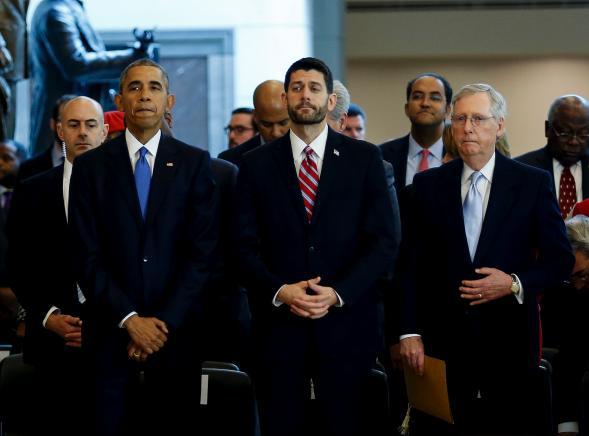President Obama is unlikely to make a recess appointment to fill the Supreme Court opening created by Justice Antonin Scalia’s death, the White House said Sunday. The announcement comes as the Obama administration appears to be slowing the pace of the nomination process after an initial flurry of activity following Obama’s announcement that a nominee would be ready to go by the end of the weekend.
The initial sense of urgency comes from the expectation that the nomination process in the Republican-controlled Senate could be one of the longest and most contentious in American history. After Scalia’s death, Republicans immediately etched bright rhetorical battle lines over not only who will replace Scalia, but, perhaps more importantly, who will choose the replacement. One option open to Obama is the recess appointment of a justice to the court, which would allow a judge to be put on the court, temporarily, without having to go through the nomination process. The Senate is in recess for another week, until Feb. 22. The White House, however, has said it will not employ this strategy:
“Given that the Senate is currently in recess, we don’t expect the President to rush this through this week, but instead will do so in due time once the Senate returns from their recess,” White House Principal Deputy Press Secretary Eric Schultz told ABC News. “At that point, we expect the Senate to consider that nominee, consistent with their responsibilities laid out in the United States Constitution.”
If the White House changes course and chooses the recess appointment route, it wouldn’t be the first time a Supreme Court justice was installed on the court without the Senate’s consent; William Brennan was appointed to the court in 1956, an election year, by Dwight Eisenhower and was later confirmed in 1957 after Eisenhower had won reelection. The politics of nominations in America have obviously changed over the past 60 years, making the appointment of justices to the federal bench a political football. Making a recess appointment would amount to a punt that would be read as an almost immediate capitulation to the apparent Republican belief that they have dibs on Scalia’s seat on the bench. “Such an appointment requires no action at all by the Senate, but the appointee can only serve until the end of the following Senate session,” SCOTUS Blog points out. “The president (if still in office) can then try again during a new Senate session, by making a new nomination, and that must be reviewed by the Senate.”
A recess appointment would likely be construed by a Republican-controlled Senate, not to mention Republican candidates for President, as subverting the intention of the nomination process laid out by the Constitution. That’s an argument—with some merit—that Obama surely wants to avoid as the White House simultaneously looks to lean heavily on the president’s constitutional responsibility to choose a justice and the Senate’s constitutional duty to confirm a reasonable selection.
